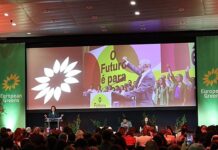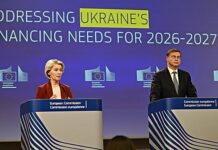
ADVERTISEMENT
The European Union has begun making overtures to Slovak Prime Minister Robert Fico ahead of a high-stakes summit on Thursday to push him toward lifting the veto he has imposed on a new round of sanctions against Russia.
Fico has no objection to the package itself, which targets Russian liquefied natural gas (LNG), oil infrastructure, the “shadow fleet” and cryptocurrency platforms, as well as the movements of Russian diplomats across the bloc, but has raised a series of unrelated grievances about energy prices, the car-making sector and competitiveness.
These issues, he said, should be discussed “substantially” at the level of EU leaders as a condition for lifting his veto.
“I am not interested in dealing with new sanctions packages against Russia until I see, in the conclusions of the summit, political instructions for the European Commission on how to address the crisis in the automotive industry and the high energy prices that are making the European economy completely uncompetitive,” Fico said last week.
“I refuse to let such serious issues be ‘handled’ in the conclusions with general phrases, while detailed decisions and positions are devoted to aid for Ukraine.”
On Monday, European Commission President Ursula von der Leyen appeared to heed the call.
In a six-page letter addressed to the 27 leaders, the chief of the EU executive commited to speeding up a planned review of a Green Deal law that would effectively ban sales of new cars with combustion engines by 2035. The review was initially scheduled for 2026. Now, the first results are expected in December.
“I decided to accelerate the review of the regulation on CO2 emission standards for cars and vans. This is now foreseen by the end of this year,” von der Leyen wrote.
The 2035 ban, agreed in the previous mandate, has galvanised conservative politicians, such as German Chancellor Friedrich Merz, Italian Premier Giorgia Meloni and Polish PM Donald Tusk.
Fico, whose country’s car-making industry is closely linked to Germany’s, is another critic.
Among their demands is permission to use e-fuels, synthetic fuels that can replace traditional diesel and gasoline and prolong the life of the combustion engine. E-fuels are controversial because their manufacturing and burning release CO2 emissions.
“In preparing the review, we are also assessing the role of zero and low-carbon fuels in the transition to zero emission road transport beyond 2030, such as e-fuels,” von der Leyen said in her letter, echoing the petition.
Von der Leyen also teased a “simplification” package for the automative sector and several adjustments to environmental regulations.
On energy prices, von der Leyen acknowledged household and industry bills remain stubbornly high and vary “significantly” from country to country, hurting the bloc’s ability compete with the United States and China, where energy costs are much lower.
To bridge the gap, she promised to table new proposals “as soon as possible”.
“We need to study short term, effective EU measures to reduce energy prices in the Union, while safeguarding the internal level playing field,” she wrote.
‘What’s the point of the meeting at all’
Von der Leyen’s letter comes as ambassadors rush to fine-tune the conclusions for Thursday’s summit, which must be agreed by consensus.
The latest draft, dated 17 October and seen by Euronews, has expanded the language on the two issues raised by Fico.
On cars, it welcomed the Commission’s decision to accelerate the review of the 2035 ban and “calls for the swift presentation of this proposal, taking into account technological neutrality”. On energy prices, the text lamented the “negative impact” on competitiveness and urges the Commission to “accelerate work on concrete proposals aimed at lowering energy prices and supporting sustainable energy production”.
Neither of the two sentences appeared in the previous version of the conclusions.
Drafting is poised to continue in the coming days. Ambassadors are keen to close the text before head of state and government take seat at the table.
Fico, however, might choose to surprise his fellow leaders by coming up his own ideas, something that could force the text to be reopened during the summit.
“If we leave the automative industry without attention, knowing the crisis we are in, and if we are unable to say anything concrete at the next European Council meeting, then I ask what’s the point of the meeting at all? Ukraine again?” Fico said last week.
“We have so many problems here in the EU that require our full attention.”
It remains unclear whether von der Leyen will pen a tailor-made letter to Fico, as she did in the summer when the Slovak leader vetoed the previous package of EU sanctions.
Back then, von der Leyen had offered assurances to the phase-out of Russian fossil fuels, which Fico has repeatedly opposed. The phase-out has received the preliminary approval by member states, with an emergency brake for Slovakia and Hungary.
“The president is in regular contact with the leaders, also in the context of any package of sanctions. The contacts are very close,” a Commission spokesperson said on Monday.
“This show the sense of urgency that President von der Leyen attaches to this issue (of the 2035 ban) and to the situation of the automative industry.”
Fico is the last remaining obstacle to approving the 19th package of EU sanctions after Austria withdrew its reservations over the weekend. Vienna had tried to compensate Raiffeisen Bank International (RBI) by unfreezing the assets of a Russian company but the contentious plan received no support from the other capitals.
















